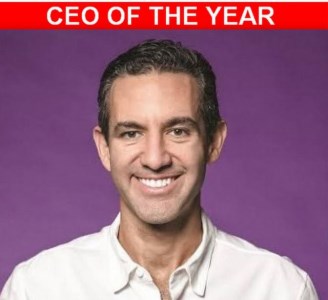CEO of the Year: David Velez
Latinvex names Nubank’s David Velez as CEO of the Year.
BY LATINVEX EDITORS
Nine years after Colombian native David Velez moved to Brazil to work as partner with investment firm Sequoia Capital, he now presides over a company that is ranked as the fourth-largest in Latin America by market capitalization and the largest bank in the region by value.
Last week, Nubank – a Brazil-based digital bank Velez co-founded in 2013 with $2 million in seed money from Sequoia and Kaszek Ventures – raised $2.6 billion in a NYSE initial public offering. That’s the largest IPO in Latin America since Brazilian credit card processor PagSeguros’ $2.7 billion offer in 2018, according to Latinvex research. Nubank plans to use the money to expand in Mexico and Colombia.
Despite only turning a small profit in the first half of this year after years of losses, investors have been impressed by Nubank’s strong growth and potential. It now boasts 48.1 million customers in Brazil, Mexico and Colombia, up from six million three years ago. It now is seeing an average of 2.1 million new customers per month.
It got there after competing head-to-head with traditional banks in Brazil by charging low or no fees while they charged notoriously high fees and not having physical branches but betting on digital solutions in contrast to the low-tech banks in Brazil. In 2019, fees made up nearly 40 percent of Brazilian banks’ revenue, compared with 15 percent to 20 percent for banks in Mexico, Argentina, Peru and Chile, according to a JPMorgan analysis quoted by Forbes. Nubank says it believes it has saved customers $4.8 billion in bank fees and about 113 million hours in wait time.
“Velez built his fintech juggernaut while previously booming Brazil suffered through recession, corruption scandals and Covid-19,” Forbes wrote in an in-depth profile of the Colombian banker and entrepreneur earlier this year. “And he did so despite warnings from Brazilians that the banking establishment would block him—or worse.”
The COVID pandemic gave the bank a boost in the sense that many Latin Americans who had doubts about having accounts with a digital bank versus a traditional one, then saw the advantage of having a strong online bank when bank branches were closed.
“The pandemic, in a way, forced that behavior to change among most of the population, because branches were closed and it wasn’t even an option,” Velez told CNBC. “People started trying us and realized we were a better option — we charge no fees, better customer experience all in your smartphone, then suddenly we started seeing people in their 60s, in their 70s, in their 80s, people all across Brazil, in different municipalities, start using us.”
MOST VALUABLE BANK
Now valued at more than $41.5 billion, Nubank has the highest market capitalization among Latin American listed banks, and the fourth-highest among all companies in Latin America.
Nubank is part of a growing trend do fintechs in Latin America. Last year, investments in fintechs in Brazil jumped 73 percent to $1.9 billion, according to the Brazilian tech consultancy Distrito Dataminer.
“Brazil’s population of 207 million, along with the shift to digital, affords fintech start-ups ample opportunity to increase their market share and win customers from the dominant top five banks,” Richard Fogarty, managing director at Alvarez & Marsal, and Tony Moroney, managing director at Beta Digital, told the Inter-American Dialogue’s Latin America Advisor last year.
Despite the amount raised at the IPO, it was not smooth sailing.
“When it started to hire the banks to coordinate the offering, Nubank was talking about a valuation of $75 billion to $100 billion,” Valor Economico reports. “Three months later, when it actually launched the offering, the level was already around $50 billion and, with a worsening scenario, it had to be reduced once again.”
Meanwhile, Nubank faced controversy when it appointed Brazil pop singer Anitta to its board in June, where she would advise the bank on enhancing its services and products.
“Anitta has a deep understanding of consumer behavior in these markets that she has explored and has a lot of experience in winning marketing strategies,” Velez said in a statement. “These skills were key to our inviting her to the Board.”
As part of the reason why she accepted the offer to join the board of a bank – a highly unusual move for an artist and performer – Anitta pointed to the need for more people to become banked.
“Not being able to have financial products is very demotivating and shameful,” she said in a statement released by Nubank. “A lot of people in Latin America have always lived off informal employment. How are those people going to have a credit history?”
The announcement sparked controversy on social media among supporters of Brazilian President Jair Bolsonaro, whom Anitta has criticized. Some threatened to close their accounts, while others praised the move, saying they would start banking with Nubank, Reuters reported.
But the appointment of Anitta fits a pattern at the bank. In Brazil, 61.3 percent of employees in leadership positions are from underrepresented groups, over 26.9 percent from the LGBTQIA+ community, over 44.4 percent are women and over 32.3 percent declare themselves as black or brown, as of September 30, 2021.
After the listing of Nubank, Velez now has a fortune of nearly $10 billion, according to Forbes. But Velez and his wife, Mariel Reyes, have signed on to the Giving Pledge, committing to giving the majority of their wealth to philanthropy – a move lauded by Microsoft founder Bill Gates.
“I applaud David Velez and Mariel Reyes’s pledge to dedicate the majority of their wealth to creating opportunity for the most vulnerable Latin American children and young adults, Gates wrote on Twitter.
For his success in building up Nubank from scratch to a top Latin American bank and providing a strong alternative to many unbanked Latin Americans, Latinvex has named David Velez CEO of the Year.
© Copyright Latinvex













